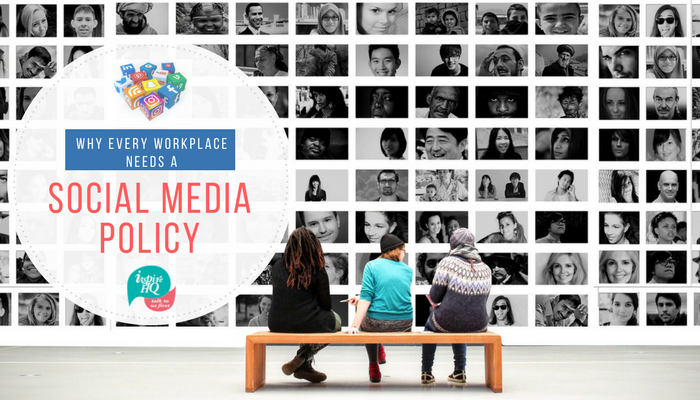The average person spends just over two hours every day on social media. Some surveys report that up to half of this time is during work hours. For employers’ social media presents a double-edged sword. On the one hand it can increase customer and employee engagement, build your networks, and is still one of the cheapest marketing tools around. However, for others it can be seen as a loss of productivity and the very nature of social media means the lines between personal and public have become increasingly blurred.
Whilst some workplaces have taken the route of tightly managing their business social media platforms and blocking social media access at work (smart phone anyone?), others allow carte blanche. The worst thing you can do is nothing at all. You can harness the benefits of social media, by putting in place a few ‘guardrails’, in the form of a Social Media Policy.
Without a policy, your business is liable for the conduct of your employees on social media, where it can be clearly linked to their employment relationship. Employees also need to be aware that their conduct, even outside of work hours, can still be bound by the requirements of their employment contract and company policies. Adding a disclaimer like “the opinions expressed are my own and do not represent the views of my employer”, won’t protect you or your employee if they decide to rant about a painful customer or detail their current conflict at work.
In a decision in 2011 (Stusel v Linfox Australia Pty Ltd), the Fair Work Commission stated that having “no social media policy was ‘not sufficient’ in this electronic age”. The Commission ruled that misconduct on social media can be a valid reason to dismiss an employee, but your case is stronger if you have a social media policy.
Your social media policy does not have to be complicated, yet should cover a few areas such as:
- Your Definition of Social Media To ensure your employees don’t think the policy is limited to the social media platforms used by your business (eg Facebook, Twitter and TripAdvisor), provide your employees with a broad definition of the digital communication tools your policy covers.
- Confidential Information Disclosing confidential information or trade secrets can represent a significant threat at any time, but with the speed at which a social media post can be shared or go viral, it is even more critical that your policy outlines what cannot be shared.
- Reputation Management Just like it’s not ok to talk about your business, colleagues or customers in a defamatory way while at work, neither is it ok to say those things on social media. Employees should also be made aware that highly contentious or derogatory comments, be they political, racial or otherwise, should also be kept private.
- Bullying and Harassment It goes without saying, discrimination, bullying and harassment of colleagues is never acceptable. Just because the misconduct is done online, does not change your liability as an employer. Your employees need to understand that your policies regarding appropriate behaviour extend to their use of social media (personal and business).
Why Embrace Social Media?
With so many staff already using social media at work, why not use it to your advantage. For those of you concerned about loss of productivity, there will always be employees who are time wasters. Addressing their lack of engagement and accountability is a management issue, not a technological one.
There is no greater advocate for your business than a passionate employee. Let them be your brand ambassadors. Encourage them to create fun content, which shows the personality and culture of your business, letting your followers see how much your employees enjoy their work. Your customers, and even potential employees, will love hearing from ‘real’ people.
Our business is active on several social media platforms. We know that we get far more engagement from our fun, friendly, ‘behind the scenes’ posts, than any that focuses solely on our products or services. It helps our customers and followers to know, like and trust us. We all contribute ideas and content, and proudly share it across our personal networks. As a result, we all feel ownership of our business’ content. Whilst we all contribute content, it isn’t a free-for-all. Behind our content sits our social media strategy and an understanding of our business’ values and goals. Our mantra is ‘don’t post anything you wouldn’t be happy to say out loud to our boss or customers’. If we are not sure, we don’t post it.
We all need to remember that whatever we post on social media is written in permanent ink and cannot be erased, even if it can be deleted.
Rather than seeing social media as a problem, it’s time to start having a conversation with your employees about how it can be managed, so that you can all help boost your business’ reputation.
Claire Huntington has over 15 years’ experience in senior and executive level human resource management and strategic leadership positions. Claire learnt HR under the wings of great mentors and through trial and error. She has a very practical hands-on approach to HR and management, and isn’t afraid to look outside the box. Claire is also mum to three primary-school aged firecrackers and is an avid photographer in her spare time.
Disclaimer: The material contained in this publication is of a general nature only. It is not, nor is intended to be, legal advice. If you wish to act based on the content of this publication, we recommend that you seek professional advice.

